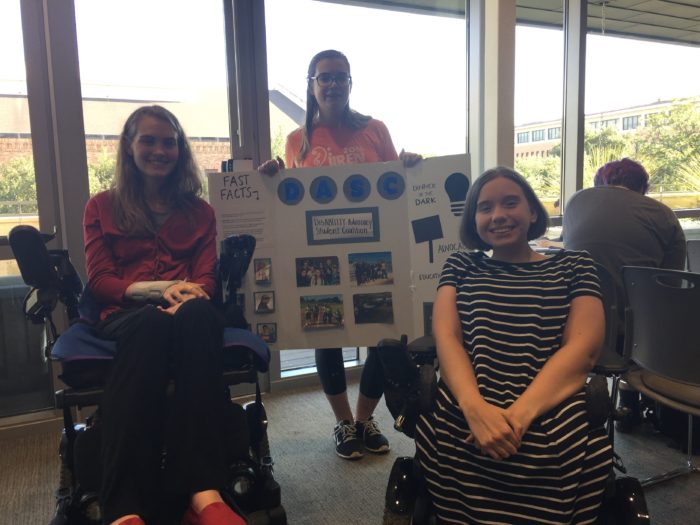
When Kate Strickland, a Plan II Honors/government junior, came to UT Austin, she immediately searched for opportunities to get involved in campus life. With help from Services for Students with Disabilities (SSD), she learned about the disABILITY Advocacy Student Coalition (DASC), a student-run organization that spreads awareness about disability and accessibility on campus and out in the community.
“When I came back to campus after my injury, I tried to join some student organizations and found they were more geared toward able-bodied people,” says Strickland, who is now president of DASC. “When I heard about DASC, I was excited to join.”
Before embarking on her undergraduate journey, Caroline Graves, a government sophomore, was also eager to join a student group. With her passion for disability rights advocacy, she found a natural fit with DASC.
“I feel very passionate about contributing to the community and working with like-minded people who share the same interests,” says Graves, who serves as recruitment chair for DASC. “Joining a club is the best way to do this.”
A large part of Graves’ work is encouraging students to get the accommodations they need to stay on top of their schoolwork. This can be challenging, she says, when they are worried about misconceived perceptions about classroom adjustments, such as extended test time and note-taking assistance.
“Accommodations are just tools to succeed,” Graves says. “They just put you on an equal-level playing field as everyone else. We want people to understand that this is not special treatment.”
In addition to spreading awareness about accommodations and other campus resources, the coalition organizes educational events, info sessions and workshops. They’re currently preparing for their next big event, Dinner in the Dark. The goal of the completely darkened banquet is to give students an idea of what it’s like to navigate life with a visual impairment. During the event, students share their experiences living with various levels of visual impairments, providing a comfortable space for participants to ask questions.
“There are a lot of misconceptions about people with outward and invisible disabilities,” Graves adds. “We want to get people to ask questions so they can better understand this community.”
Throughout their advocacy work, Strickland, Graves—and all members of DASC—hope to drive home one important message: See the able not the label.
“We want people to know that having a disability is not a limiting factor,” Strickland says. “Embrace what you can do and focus on your strengths.”


